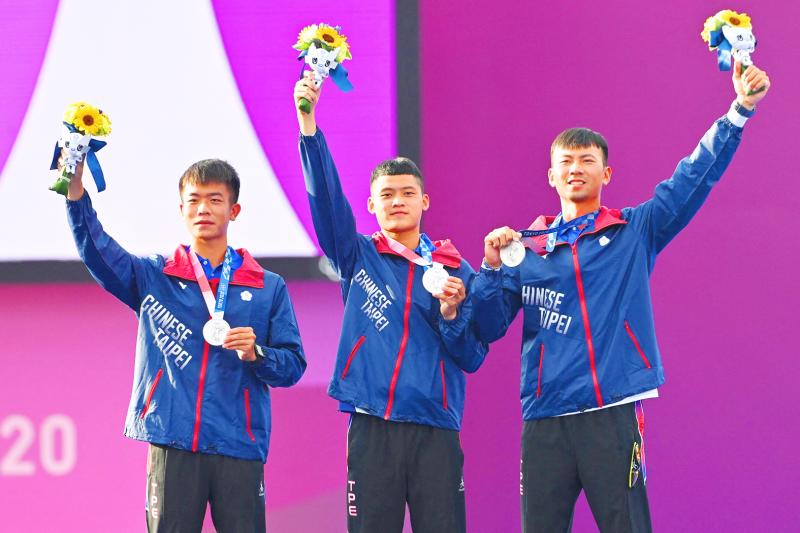Taiwan’s men’s archery team yesterday bagged a silver medal after being beaten by South Korea in the gold medal match at the Olympic Games in Tokyo.
South Korea’s three archers were unerringly precise in beating Taiwan 6-0, shooting perfect 10s with 13 of their 18 arrows.
Taiwan’s Tang Chih-chun (湯智鈞), Wei Chun-heng (魏均珩) and Deng Yu-cheng (鄧宇成) posted respectable scores, including six 10s from 18 arrows, but respectable was not enough in a final in which South Korea were at their dominant best.

Photo: AFP
It was the fifth gold medal for South Korea’s men in the team event at the past six Olympic Games.
The silver was the fourth medal Taiwan’s archers have won at an Olympic Games.
After matching Taiwan’s best finish ever in Athens in 2004, Wei remained humble, telling reporters that the team still had much to learn and improve on.
Tang admitted that he was so nervous before the gold medal match that he was shaking badly when he walked into the venue.
“Of course, I wish to have had a better result, [but] I’m quite satisfied,” Deng said.
Their coach, Liu Chan-ming (劉展明), attributed the silver medal to the efforts of the entire Olympic archery squad, including the women’s archery team that was ousted in the opening round a day earlier, for sharing tips on the venue.
“We are the best team,” Liu said.
In the team archery competition, the teams compete in games of six arrows, with each of the three team members firing two arrows. Winning a game earns two points and a tie is worth one point, with the first team to garner five points winning the match.
Taiwan advanced to the gold medal match after eliminating Australia in a shoot-off in the opening round, before topping China 5-1 in the quarter-finals earlier yesterday.
The archers then completed a three-game 6-0 whitewash of the Netherlands with five 10s out of six in the semi-finals to give themselves a shot at Olympic gold for the first time in 17 years.
Wei, Tang and Deng were likely hoping that momentum would carry over to the final, but when South Korea opened with a 59 in the first frame (five 10s and a 9) to Taiwan’s 55 and a perfect 60 in the second game to Taiwan’s 58, it was clear South Korea were headed for gold.
The silver was the third medal overall for Taiwan at this year’s Olympic Games. Table tennis mixed doubles duo Lin Yun-ju (林昀儒) and Cheng I-ching (鄭怡靜) added a bronze medal to the tally later yesterday.
Additional reporting by AP

MAKING WAVES: China’s maritime militia could become a nontraditional threat in war, clogging up shipping lanes to prevent US or Japanese intervention, a report said About 1,900 Chinese ships flying flags of convenience and fishing vessels that participated in China’s military exercises around Taiwan last month and in January last year have been listed for monitoring, Coast Guard Administration (CGA) Deputy Director-General Hsieh Ching-chin (謝慶欽) said yesterday. Following amendments to the Commercial Port Act (商港法) and the Law of Ships (船舶法) last month, the CGA can designate possible berthing areas or deny ports of call for vessels suspected of loitering around areas where undersea cables can be accessed, Oceans Affairs Council Minister Kuan Bi-ling (管碧玲) said. The list of suspected ships, originally 300, had risen to about

DAREDEVIL: Honnold said it had always been a dream of his to climb Taipei 101, while a Netflix producer said the skyscraper was ‘a real icon of this country’ US climber Alex Honnold yesterday took on Taiwan’s tallest building, becoming the first person to scale Taipei 101 without a rope, harness or safety net. Hundreds of spectators gathered at the base of the 101-story skyscraper to watch Honnold, 40, embark on his daredevil feat, which was also broadcast live on Netflix. Dressed in a red T-shirt and yellow custom-made climbing shoes, Honnold swiftly moved up the southeast face of the glass and steel building. At one point, he stepped onto a platform midway up to wave down at fans and onlookers who were taking photos. People watching from inside

Japan’s strategic alliance with the US would collapse if Tokyo were to turn away from a conflict in Taiwan, Japanese Prime Minister Sanae Takaichi said yesterday, but distanced herself from previous comments that suggested a possible military response in such an event. Takaichi expressed her latest views on a nationally broadcast TV program late on Monday, where an opposition party leader criticized her for igniting tensions with China with the earlier remarks. Ties between Japan and China have sunk to the worst level in years after Takaichi said in November that a hypothetical Chinese attack on Taiwan could bring about a Japanese

The WHO ignored early COVID-19 warnings from Taiwan, US Deputy Secretary of Health and Human Services Jim O’Neill said on Friday, as part of justification for Washington withdrawing from the global health body. US Secretary of State Marco Rubio on Thursday said that the US was pulling out of the UN agency, as it failed to fulfill its responsibilities during the COVID-19 pandemic. The WHO “ignored early COVID warnings from Taiwan in 2019 by pretending Taiwan did not exist, O’Neill wrote on X on Friday, Taiwan time. “It ignored rigorous science and promoted lockdowns.” The US will “continue international coordination on infectious